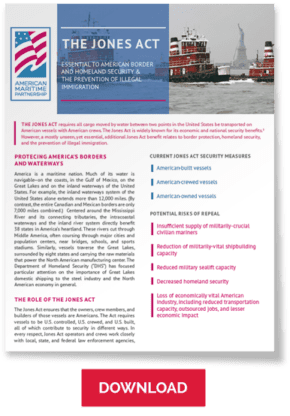 America’s homeland security depends on secure domestic waterways. Our national security is enhanced by requirements that domestic commerce be conducted on American vessels in full compliance with U.S. laws and under the consistent oversight of the U.S. government.
America’s homeland security depends on secure domestic waterways. Our national security is enhanced by requirements that domestic commerce be conducted on American vessels in full compliance with U.S. laws and under the consistent oversight of the U.S. government.
Today, agencies such as Customs, Immigration, Homeland Security and others scrutinize foreign ships entering U.S. harbors. There is considerable uncertainty about what laws would apply if these foreign vessels were allowed into our domestic trades. Monitoring, regulating and overseeing potentially tens of thousands of foreign-controlled and foreign-crewed vessels operating in domestic U.S. commerce would be a daunting task.
It takes a small army of customs agents, immigration services officials, homeland security staff and other personnel to regulate foreign ships that enter and exit the U.S. in international trade—even within the carefully controlled structure of U.S. ports. However, there is no precedent for allowing foreign-controlled ships operated by foreign crews to move freely throughout the tens of thousands of miles of America’s navigational “bloodstream.” Our inland lakes, rivers and waterways lead to virtually every corner of the nation.Without American maritime, the U.S. would be completely dependent on foreign-owned and flagged vessels for the transport of all waterborne commerce into and out of the country.
As America works to secure its borders, it must also secure its waterways.
National security is enhanced by the requirement for American vessels operated by American crews and owned by American companies. American mariners act as the eyes and ears of our government enforcement agencies and help maintain the security of our inland and coastal waterways. In fact, AMP members have developed their own reporting mechanisms for contacting the appropriate government agency in the event crews observe questionable activity. In this respect, the Jones Act is as effective a homeland security measure as any federal agency could ever implement and enforce. Repeal or modification of this key domestic maritime law would make America more vulnerable and less secure.
America’s domestic fleet is an important part of the national maritime infrastructure that helps ensure ample U.S. sealift capacity is available to defend and supply our cities. American ships, along with the crews to operate them, transport construction and repair yards, intermodal equipment, terminals, cargo tracking systems and other important infrastructure can be made available to the U.S. military at a moment’s notice in times of war, national emergency, or even in peacetime.
The U.S. Navy’s position is clear—repeal of the Jones Act would “hamper [America’s] ability to meet strategic sealift requirements and Navy shipbuilding.”
“As a maritime nation, the United States depends not only on a strong Navy, Marine Corps and Coast Guard, it also requires a strong commercial maritime industry. The Jones Act must be maintained so that the more than 8,000 U.S. citizen mariners can continue to provide the economic and military support that is critical to our national interests.” – Daniel Branch, president of the Navy League of the United States

